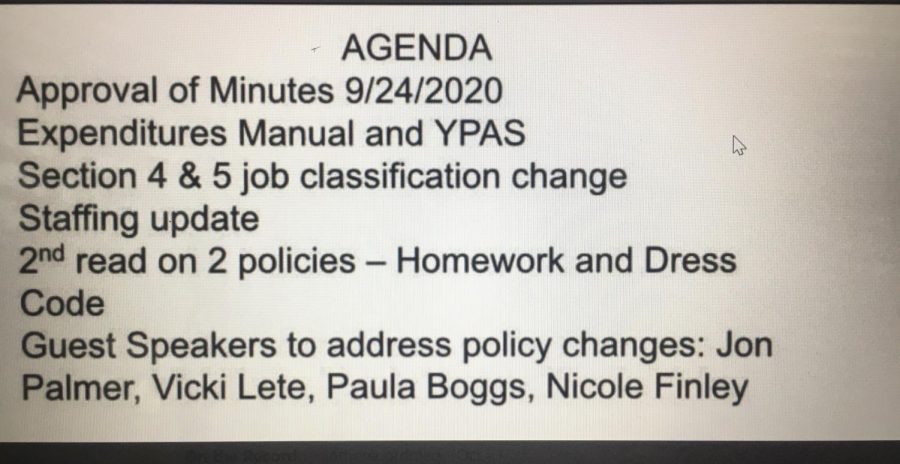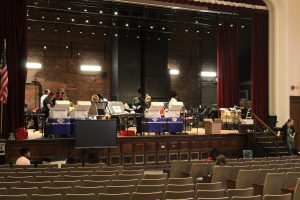October SBDM meeting revisits dress code policy
This SBDM meeting brings a second reading of the dress code and homework policy
October 22, 2020
Manual’s October virtual SBDM meeting commenced at 3:02 p.m. with an additional six guests present to speak about the dress code policy.
First, the September minutes were approved at 3:05 p.m.
Next, the Manual and YPAS expenditures were reviewed and then approved by all SBDM members.
“This is the ledger report for Manual high school in terms of the activity funds. I’m signing a lot of refund checks from last year. That’s still happening,” Principal Farmer said.
Then, the SBDM members addressed the third item on the agenda concerning the new ECE teacher Mr. Coleman.
Manual was unable to hire a new teacher without an open position available, so Mr. Stevenson’s retirement position was utilized. However, since Mr. Coleman is an ECE teacher he couldn’t be placed under that specific control number and had to be moved. The SBDM committee approved moving him under the correct control number and fixed the job classification change.
Next, Farmer detailed staffing updates, both pertaining to the counseling office.
“We interviewed a new counselor, Dr. Jessica Benson. She hails from Southern high school and comes with a wealth of knowledge and experience. She just really impressed us…She seems to be very sharp,” Farmer said.
The date of her beginning is still yet to be determined. Ms. Romans will still remain a freshman advisor. The new counseling clerk Ms. Carry Roth will start on Oct. 26.
The homework policy had its second read afterward. Ms. Alesia Williams brought up some complaints that she’d received from her peers about a certain phrase discussing homework load.
“It says teachers will not assign an abnormal amount of homework… abnormal is too subjective,” Williams said.
After a brief discussion about the choice of diction, the committee settled on changing the phrase to, “Teachers will not assign additional homework to their typical homework load.”
The policy had no other objections and it was approved to have another first read at the November SBDM meeting. The updated policy will be sent out to the Manual faculty.
Afterward, the dress code policy had its second read and Williams reminded everyone that the reason they had to change the policy is that it didn’t pass the REAP last year.
Farmer then called for the guests to speak, allotting each individual exactly three minutes to express their support or lack thereof for the policy.
Farmer himself read off three letters he received from parents, all in favor of the new policy.
Mr. Palmer spoke first, raising concerns about the security issues surrounding hoodies and lack of language regarding IDs.
“For 2,000 students, there’s only four of us that watch them all on a daily basis… it’s hard to keep up, I’m going to be honest. We have to be able to tell who the students are. There are some things that make it hard to tell the difference between the students and the general public. We’re also in an area with a high sex offender registry. I have concerns,” Palmer said.
He also cited speaking with a group of students who were racial minorities, who questioned where the ‘racial disparity’ portion of the dress code came from and who brought that up. He urged SBDM to talk to a more diverse group of stakeholders.
Next Ms. Finley spoke, expressing concern over the overuse of the word ‘should’ in the policy.
“My concern is that sometimes we have so much specificity, we have so much detail that it discriminates… The reasons we have all these issues between black, brown and white is because we have all these shoulds. The majority is telling everyone what they should and should not do,” Finley said.
Ms. Lete was the third guest, representing the administrative team. She explained how the purpose of the dress code is to represent Manual’s core values and prepare students for the next level of their lives.
They liked the first part of the policy but raised a few issues in later portions. The administrative team feels as if the language used is too vague when specifying what can be worn as a top and bottom.
They recommended the fingertip rule for part of the description of what could be worn as a bottom, to add further clarity and maintain equity. They also agreed with Mr. Palmer’s stance that allowing students to wear hoods around is a safety concern and that school personnel needs to be able to identify students at all times.
Lete also stated that the team thought the phrase “nipple, genitals, buttocks” should be removed, and less offensive language be chosen.
“There was no representation from the administrative team. I would love to be part of the solution to dress code and willing to serve at any point,” Lete said.
Manual student Sophie Stinnett (10, HSU) spoke in support of the new policy and told an anecdote about how she and six other girls were dress coded during geometry class their freshman year.
Stinnett was wearing running shorts that she had previously worn multiple times to school, and her mother had even measured the shorts and ensured they followed dress code policy.
Stinnett, alongside six other of her female classmates, was dress coded by the teacher and sent to the office. Her mother was unable to bring her a change of clothing and so she sat waiting, missing her entire block and therefore an entire class worth of instruction.
“I felt a range of emotions. I felt objectified… I felt disrespected… I felt ashamed…Constantly worrying about our clothing makes us stressed and worried about things other than our education… I did not go to school to be sexualized for wearing leggings… Trust us to make the right decisions, guide us, not shame us…,” Stinnett said.
Elizabeth Mays, a Manual parent and member of the JCPS Foundation Board, also expressed her support for the new dress code.
“In these times of heightened anxiety and depression, I would like to see Manual adopt this proposed dress code that takes away the shaming and blaming of girls and people of color,” Mays said.
Farmer closed up the discussion by reading two more letters sent to him from Manual parents, both in favor of the newly revised dress code. Farmer opened up the floor to SBDM members after he finished.
Applegate raised the concern that he thought they needed more community feedback; Weiss countered by saying that the committee had been trying to do that but faced difficulty in getting a large number of responses.
She motioned to hold a special SBDM meeting with Farmer as an administrative representative in order to work on revising and incorporating these concerns into the dress code policy.
Brian Hinds seconded the motion and the rest of the committee approved it.
SBDM is unable to hold a closed meeting, so it will be an open work meeting, with Weiss sending an email to all SBDM members with further details.
Farmer asked the guests who spoke to email him their speeches so that the members could keep their concerns in mind.
The meeting adjourned at 4:11 pm.









